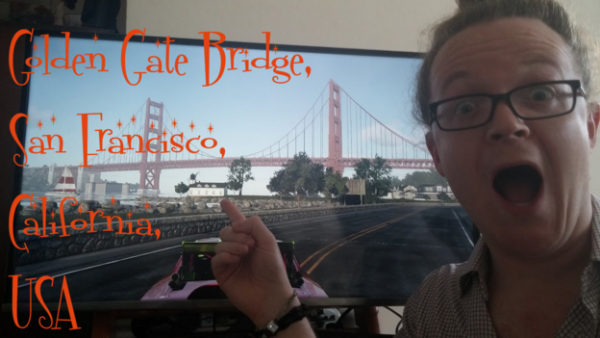
Due Diligence: Postcard America’s Aight By Me
Leigh Harrison goes on a road trip.
A man named Austin Walker once told me, in what I consider to be one of the finest videogame reviews ever committed to public record, that The Crew and its miniature pastiche of the United States, its “Postcard America”, are horrendous. He said the game’s driving is flat, that its sub Fast and Furious story is abysmal, and that its drip-feed levelling system is both insidious and ruinous to its experience—none of which I disagree with. But he also said that these things conspire to remove any joy from exploring this Postcard America; that The Crew manages to ruin the Great American Roadtrip. And it’s here where our opinions must diverge for a couple of reasons.
I don’t like driving games and I’m not American, and that’s why I can’t help but be swept along on The Crew’s tide of car-based reverie. I don’t have the capacity to understand if it’s a decent representation of either its subject matter or setting, so I’ve just got to go with my gut. And every fiber of my being tells me The Crew is something that appeals to me tremendously.
Apparently the term ‘carPG’—meaning a roleplaying game about cars—is now acceptable to use in everyday conversation, thanks primarily to The Crew and its two Test Drive Unlimited forerunners. That I shudder every time I hear or utter the awkward portmanteau matters not. The carPG offers me that attractive ‘go anywhere, do anything’ deal so often missing from other driving games, with their linear progression and insistence on rewarding skill and skill alone. I’m not good at driving cars well, so the ability for me to escape the cycle of crashing and embarrassment via The Crew’s wilderness-like structure is comforting. With only a touch of hyperbole: I don’t actually have to be any good at all to succeed in The Crew, thanks to its Dick Dastardly-style ineptly evil levelling system.
You start off The Crew with an attractive but unwieldy car and incrementally upgrade it as you go. It improves constantly and compulsively as you tick off story activities and the hundreds of little, 30 second challenges that dot the game’s roads. These are everywhere, and once triggered will task you with driving very fast, jumping very far, slaloming for a certain distance, or one of the many other fun things automobiles are able, though not necessarily designed, to do. Performance is ranked from bronze, to silver, to gold, with the barrier to initial success set so low it’s almost impossible to outright fail. Accomplishing anything rewards you with an upgrade and a little pat on the back from the game, as it simultaneously congratulates and pushes you on to find the next tiny victory. It’s open world design 101, but it also taps into the game’s love affair with the US and the American Dream. As long as you’re willing to put the effort into playing it, The Crew will reward you with boundless progression, as you systematically ascend through its arbitrary hierarchies on yet another meteoric rise to the top. It really is the stuff of Hollywood, or, indeed, videogames.

I, for whatever reason, though maybe because I’m just stupidly sentimental, dutifully accepted the game’s generous offer of ceaseless instant gratification and self-betterment, and found myself sitting with The Crew for a sustained period of time. So long, in fact, that I could have quite comfortably managed an actual road trip across America, instead of sitting in my living room pretending to be an off-brand Paul Walker, gently whispering “hey, bro” to myself for nights on end. Despite this painstaking effort to improve my vehicle’s performance I still don’t know anything about cars, which is probably because The Crew doesn’t seem to either. Every upgrade is given to you in the form of a component which slots into a part of your vehicle. Sometimes you’ll get new brakes or better suspension. Other times you’ll get new, faster-winding windows, or better tints for those better windows. One of the rarest upgrades—I still don’t know if it even really exists—is scissor doors, the ones on sports cars that flip up instead of out, which do nothing but make your car look achingly cool. What any of these upgrades are or even what they do is academic; upgrades all come with bigger numbers that affect something. Slot that sweet exhaust muffler you just won into your ride and its top speed will jump from 402 to 413. Nobody knows what this means—it certainly isn’t your top speed in miles or kilometers per hour; useful, real world information like that is never given to you—but the number 413 is shown in a bright green box so it must be good.
Thanks to the game’s sprawling mess of a structure—lots of itty bitty tasks, repeated ad nauseum—you’re seeing these numbers in green boxes every few minutes. Seeing them becomes disgustingly addictive. Every time they pop up your car improves, only very slightly and in ways that are wholly unfathomable, but it’s enough so you’re compelled to keep going for the next little high. It’s amazing how well this system worked on me, and I’m sure it’s down to the speed at which progression is doled out. Unlike any genuine stab at Life, Liberty and the pursuit of Happiness, which I’m sure isn’t a straight line from inner city slum to picket fence suburbia, The Crew is content with simply giving you the trinkets of success without actually asking you to put in any of the work. I’m no expert—where I’m from we have no t-shirt-ready aspirational slogans to motivate us towards greatness—but the spoils of doing well should really extend beyond glittery symbols of wealth.

All the same, The Crew batters you around the head with its take on the American Dream with such frequency that it’s ultimately unavoidable. When discussing mastering videogame challenges, reprehensible people often utter the embarrassing words “git gud”, which alongside making language like carPG sound perfectly acceptable, also encapsulates The Crew’s stance on progression. It’s simply a matter of course that you get better at playing it. Just like all the actors who became politicians, the rappers with billion dollar business empires, and your neighbor who shoots bears with an assault rifle on the weekend just because she can, America is a place where dreams turn into reality and failure doesn’t exist.
With its upgrade system and insistence on constant, Star-Spangled progression, The Crew effectively turns levelling up into a premium currency. That isn’t to say you must buy that progression—though you can of course purchase Crew Credits to aid you with it—but that the game warps your inputs until they lose all meaning outside of its own logic. Just like Candy Crush converts hard cash into gold bars to obfuscate the fact that a handful of retries cost you a dollar, The Crew takes your time (and maybe skill if you’re not me) and smooshes it into numbers inside of green boxes. They mean absolutely nothing, but since you haven’t anything to compare them to you’re stuck chasing the singular high of these colorful little rewards. They are everything and nothing. Pure, evil compulsion generators.
Now, as I said, I’m probably only partially a moron, so I did keep plugging away at The Crew for reasons other than that it told me to. While no single activity provides a meaningful reward in and of itself, the game’s Ubisoftian design, predicated largely on content overload, means that it’s possible to drive around scooping up upgrades at an alarming rate. When it comes to dumping challenges onto its map, The Crew simply doesn’t know when to stop, and so after a dozen or so hours I’d incrementally upgraded my car to the point of absurdity. By a third of the way into the game I’d effectively removed all challenge from its story missions, all of which have their difficulty set via an arbitrary RPG “recommended level” mechanic. I played The Crew for long enough, and levelled my car to such an extent, that it had no option but to make itself easy for me as a reward. This was great, because it allowed me to sidestep the racing and see what The Crew is really good at.

As mentioned a couple of miles back up the freeway: I’m totally not American. I have to pretend I am by using a lot less ‘u’s and overwrought, multi-clause sentences when I write, but I’m from the north of England, really. As an Englishman it would be very easy to perpetuate all those snide anti-Americanisms we’re so good at here, but we’d be missing the point. Behind the “Americans are all fat idiots” type jibes lies the real truth: we’re terrified, yes, but also deeply enchanted by the US. The guns; the terrible processed food; the ridiculously high esteem in which patriotism is held; the popularity contest nature of politics; the strangeness of every single road being poker straight, except for that famously bendy one in San Francisco of course, and meeting all the other straight roads at precise right angles. America is an alien place of weird, almost imaginary bizarreness to most of us from my corner of the Old World. It’s also massive and largely empty, which, when combined with all the cultural insanity our stereotypes of America imbue on the US of A, makes it an insatiably attractive place to many of us.
The Crew doesn’t attempt to replicate any of the societal nuance of the US—it’s a videogame about cars, remember—but it does do a grand job of providing a sanitized and pint-sized America for me to drive around in—which in the end is a much more manageable task. Anyway, this is America we’re talking about: land of “go big or go home” bombast, sweeping generalizations, and mountains carved to look like historical figures. We don’t need subtlety or accuracy, right? We’re in the USA! Viewed as a metaphor for an outsider’s imagined concept of North America the landmass and North America the place, The Crew is utterly breathtaking.
The game’s world is a greatest hits compilation of the mainland US and its best asset. It takes about an hour to drive from New York City to Los Angeles, and this rather staggering size allows it to contain all your favourite landmarks without them being squished together, and deserts switching straight to redwood forests along jarring boundaries. The tracts of countryside gently roll from plain, to mountain, to savannah, to coastal plateau, as you push the horizon ever backwards. Yes, the game’s north east coast is dispiritingly identical to its north west coast, but there’s so much scenery in between that it really doesn’t matter. Even the cities feel large enough to do their job, despite being necessarily and sensibly condensed from their real world dystopian sprawls into something much more manageable and un-American.

It is the big, beautiful tourism simulator at the heart of The Crew that really matters to me. It’s why I don’t feel ashamed that I sunk tens of hours into setting pointless speed records down highways. Because while every ounce of the game wants me to think each upgrade is nothing more than a route to the next, eventually they all added up to something: to freedom—to me not having to play any more of The Crew as it wanted me to. Once I upgraded my car with all its shiny baubles I was able to soar above its tedious story and just drive its roads unhindered. Well, I completed its tedious story, just without trying, which with my history of driving game failures is the same thing. I may have followed the game’s defined path, but I feel that I loosed myself from its grasp. I finished its story with minimal effort and then just stopped chasing upgrades. I had, in effect, truly beaten it.
Unshackled, I rummaged around in its world. I visited Niagara Falls, that desert from all the Westerns, and the Everglades. I saw Seattle, Dallas, and Detroit. I went to the White House, the Golden Gate Bridge, and the sculpture from the intro to Kenan & Kel. I saw it all. Or at least as much as an ignorant tourist would ever want to see. Austin Walker once told me that The Crew and its Postcard America are horrendous. That they are superficial representations of much more complex entities. And they probably are. But from where I’m coming from they’re everything I know and ever want to know about driving cars really fast in America. The Crew reinforces all the wonderfully crude stereotypes mainstream American culture has crafted for me to consume. I’m happy it serves them up wholesale, in all their daunting, maniacal, inflated beauty, for me to chug down and continue to base my knowingly ill-informed opinions on. Because if videogames can’t even manage that anymore, there’s no hope for them achieving anything loftier.
Leigh Harrison lives in London, makes DVDs for a living and owns a hamster. He likes canals and rivers a great deal, and spends a lot of his time walking. He occasionally says things about videogames on the Internet, and other things on The Twitter.